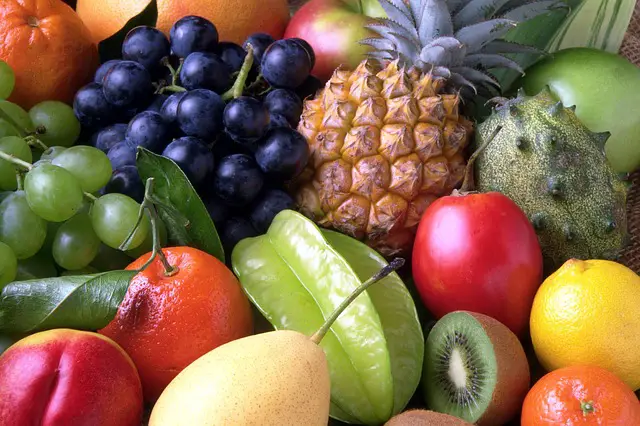You probably know that fresh fruits are healthy, but do you know the specific health benefits provided by certain fruits?
Read on to learn about the numerous health perks associated with different types of fruit.
Some of them may pleasantly surprise you. One of these super fruits could even make you happier!
Mangos
Mangos are a good source of ascorbic acid, carotenoids, and phenolic compounds, which are antioxidants that can prevent disease, according to the authors of a 2011 study published in the journal Scientia Horticulturae.(1)
The authors of this study reported that a recent study conducted by Texas AgriLife Research showed that mangos effectively prevented or stopped the growth of colon and breast cancers, and they had some effect on lung cancer, prostate cancer, and leukemia.
In addition to their disease-fighting properties, mangos may aid weight loss efforts, as they contain catechins and epicatechins.
The results of a 2002 study published in the journal Phytomedicine indicated that individuals who consumed catechins during a three-month period lost 4.6 percent of their body weight, on average.(2)
Bananas
According to a 2005 report published in Mother Earth News, bananas provide a host of health benefits, including high levels of potassium, which regulate blood pressure and keep kidneys functioning properly.(3)
In addition, the authors explained that bananas contain tryptophan, which the body uses to make serotonin.
Serotonin, the authors reported, regulates mood, and increased levels of serotonin lead to elevated moods.
Watermelon
The antioxidant properties of watermelon may fight against disease.
According to the authors of a 2003 study published in the Journal of Nutrition, watermelon is an excellent source of the antioxidant lycopene.(4)
The results of a study published in a 1997 edition of the American Journal of Epidemiology indicated that lycopene significantly reduced the risk of heart attack, and it was more effective than other antioxidants.(5)
The authors of a 2001 study published in the International Journal of Food Sciences and Nutrition have also suggested that the antioxidant properties of lycopene may stop the growth of cancer cells.(6)
Strawberries
The author of a report published in 2004 in the journal Critical Reviews in Food Science and Nutrition advised that the flavonoids in strawberries reduce the risk of heart disease by reducing bad cholesterol and decreasing the risk of blood clots.(7)
The author further explained that strawberries have been found to reduce inflammation, and they contain compounds that have been shown, by experimental research, to be effective in cancer prevention.
Read more: Are strawberries a citrus fruits?
Grapes
The authors of a 2013 review published in Nutrition Today concluded that grapes, particularly the red and purple variety, could reduce inflammation and promote heart health.(8)
The authors recommended consuming 165 to 200 grams of fresh grapes per day to reap these benefits.
This is the equivalent of about one cup of grapes, or 40 average-sized grapes.
Conclusion
Research indicates that grapes and the other fruits discussed here can have a favorable impact on overall health by protecting the body from disease.
To enjoy the protective effects of fruits, eat them as side items with your meals, or mix them in with a scoop of frozen yogurt for a decadent dessert!
Researches and references
(1)http://today.agrilife.org/2010/01/11/mango-effective-in-preventing-stopping-certain-colon-breast-cancer-cells/
(2)http://www.sciencedirect.com/science/article/pii/S0944711304700744
(3)http://www.motherearthnews.com/real-food/the-33-greatest-foods-for-healthy-living.aspx?PageId=2
(4)http://jn.nutrition.org/content/133/4/1043.full
(5)http://aje.oxfordjournals.org/content/146/8/618.full.pdf
(6)http://www.tandfonline.com/doi/abs/10.1080/09637480020027000-4
(7)http://www.tandfonline.com/doi/abs/10.1080/10408690490263756
(8)http://journals.lww.com/nutritiontodayonline/Abstract/2013/01000/Grapes_and_Grape_Products__Their_Role_in_Health.8.aspx
Leave Feedback: Was this article helpful?

